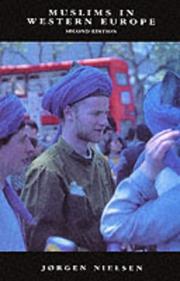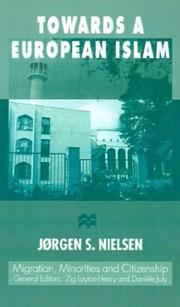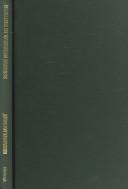| Listing 1 - 10 of 49 | << page >> |
Sort by
|
Book
ISBN: 9062580556 9789062580552 Year: 1985 Volume: 55 55 Publisher: Istanbul: Nederlands Historisch-Archaeologisch Instituut te İstanbul,
Abstract | Keywords | Export | Availability | Bookmark
 Loading...
Loading...Choose an application
- Reference Manager
- EndNote
- RefWorks (Direct export to RefWorks)
Judicial review of administrative acts --- Justice, Administration of --- Mamelukes --- History --- Islamic Empire --- Dīwān al-Maẓālim --- Mamelukes and courts --- -Courts --- -Mamelukes --- Law, Medieval --- Medieval law --- Mamluks --- Courts --- Judiciary --- Dispute resolution (Law) --- Judicial districts --- Law --- Procedure (Law) --- Judicial power --- Jurisdiction --- Administration of justice --- Law and legislation --- -Arab countries --- Arab Empire --- Empire, Islamic --- Middle East --- Muslim Empire --- -History --- Mamelukes. --- -Justice, Administration of --- Judicial review of administrative acts - Islamic Empire - History --- Justice, Administration of - Islamic Empire --- Islamic Empire - History - 1258-1517

ISBN: 0748606173 9780748606177 Year: 1995 Volume: *1 Publisher: Edinburgh: Edinburgh University Press in association with The Aga Khan University,
Abstract | Keywords | Export | Availability | Bookmark
 Loading...
Loading...Choose an application
- Reference Manager
- EndNote
- RefWorks (Direct export to RefWorks)
Europe --- Muslims --- Ethnic relations --- History --- Europe, Western --- -#A9511A --- 297 <4> --- Mohammedans --- Moors (People) --- Moslems --- Muhammadans --- Musalmans --- Mussalmans --- Mussulmans --- Mussulmen --- Religious adherents --- Islam --- -Islam. Mohammedanisme--Europa --- -West Europe --- Western Europe --- -Ethnic relations --- 20th century --- Muslims - Europe - History - 20th century. --- #A9511A --- Islam. Mohammedanisme--Europa --- West Europe --- Ethnic relations. --- Europe - Europe - Ethnic relations - 20th century --- Europe - Ethnic relations --- Muslims - Europe, Western - History - 20th century --- Europe, Western - Ethnic relations --- Muslims in Western Europe --- Muslim immigration --- politics:law --- culture --- education

ISBN: 0312221436 0333723740 9780312221430 9780333723746 Year: 1999 Publisher: New York: St. Martin's press,
Abstract | Keywords | Export | Availability | Bookmark
 Loading...
Loading...Choose an application
- Reference Manager
- EndNote
- RefWorks (Direct export to RefWorks)
"The year 1989 was the year of the 'affairs' Rushdie in Britain and headscarves in France. The public and politicians suddenly noticed that Islam had established a visible presence in the cities of western Europe. This book follows the development of Islam in the region through this watershed."
Muslims --- Islam --- Minorities --- Musulmans --- Minorités --- Europe --- Great Britain --- Grande-Bretagne --- Ethnic relations. --- Relations interethniques --- England --- Ethnic relations --- 297 <4> --- Islam. Mohammedanisme--Europa --- Minorités --- Mohammedans --- Moors (People) --- Moslems --- Muhammadans --- Musalmans --- Mussalmans --- Mussulmans --- Mussulmen --- Religious adherents --- Ethnic minorities --- Foreign population --- Minority groups --- Persons --- Assimilation (Sociology) --- Discrimination --- Majorities --- Plebiscite --- Race relations --- Segregation --- Mohammedanism --- Muhammadanism --- Muslimism --- Mussulmanism --- Religions --- Angleterre --- Anglii︠a︡ --- Inghilterra --- Engeland --- Inglaterra --- Anglija --- England and Wales --- Muslims - Europe --- Muslims - England --- Islam - Europe --- Islam - England --- Minorities - Europe --- Minorities - England --- Europe - Ethnic relations --- England - Ethnic relations
Book
ISBN: 0748603093 9780748603091 Year: 1992 Volume: 20 Publisher: Edinburgh: Edinburgh University Press in association with The Aga Khan University,
Abstract | Keywords | Export | Availability | Bookmark
 Loading...
Loading...Choose an application
- Reference Manager
- EndNote
- RefWorks (Direct export to RefWorks)
Europe --- Muslims --- Ethnic relations --- History --- Europe, Western --- -Europe --- -Mohammedans --- Moors (People) --- Moslems --- Muhammadans --- Musalmans --- Mussalmans --- Mussulmans --- Mussulmen --- Religious adherents --- Islam --- -Ethnic relations --- -History --- Mohammedans --- Ethnic relations. --- Europe - Europe - Ethnic relations - 20th century --- Europe - Ethnic relations --- Muslims - Europe, Western - History - 20th century --- Europe, Western - Ethnic relations
Book
ISBN: 9780748646944 9780748646951 9780748695874 0748695877 0748646949 0748646957 074868428X 1299483763 1784027375 9781299483767 9780748677535 0748677534 9780748677528 0748677526 9781784027377 Year: 2013 Publisher: Edinburgh: Edinburgh University Press in association with The Aga Khan University,
Abstract | Keywords | Export | Availability | Bookmark
 Loading...
Loading...Choose an application
- Reference Manager
- EndNote
- RefWorks (Direct export to RefWorks)
Analyses European Muslim communities' developing involvement in their political environment and related Muslim and public debates. Muslims are increasingly making themselves noticed in the political process of Europe. But what is happening behind the often sensational headlines? This book looks at the processes and realities of Muslim participation in local and national politics: voting patterns in local and national assemblies and the tensions between ethnic, political and religious identities. These developments drive internal Muslim debates including attitudes to the democratic processes and whether Muslims should take part at all, as well as rivalries over who should represent and speak for Muslims. They also inspire sharp European discussion about Muslim political participation - does it signal integration or separation? - and how the European states should view this increasingly active role of Muslims in the public space.
Muslims --- Islam and politics --- Political participation --- Politics and government --- Musulmans --- Islam et politique --- Participation politique --- Activité politique --- Politics and government. --- Muslims - Europe - Politics and government --- Islam and politics - Europe --- Political participation - Europe

ISBN: 0748618449 Year: 2004 Publisher: Edinburgh Edinburgh university press
Abstract | Keywords | Export | Availability | Bookmark
 Loading...
Loading...Choose an application
- Reference Manager
- EndNote
- RefWorks (Direct export to RefWorks)
Book
ISSN: 18771432 ISBN: 9789004184756 9004184759 9789004184763 9004184767 1283119560 9786613119568 Year: 2010 Volume: 2 Publisher: Leiden: Brill,
Abstract | Keywords | Export | Availability | Bookmark
 Loading...
Loading...Choose an application
- Reference Manager
- EndNote
- RefWorks (Direct export to RefWorks)
The Yearbook of Muslims in Europe provides an up-to-date account of the situation of Muslims in Europe. Covering 46 countries of Europe from the Atlantic to the Urals, the Yearbook consists of three sections: the first section presents a country-by-country summary of essential data with basic statistics with evaluations of their reliability, surveys of legal status and arrangements, organisations, et cetera Data have been brought up to date from the first volume. The second section contains analysis and research articles on issues and themes of current relevance written by experts in the field. The final section provides reviews of recently published books of significance. The Yearbook is an important source of reference for government and NGO officials, journalists, and policy makers as well as researchers
Muslims --- Islam --- Europe --- Ethnic relations --- Mohammedanism --- Muhammadanism --- Muslimism --- Mussulmanism --- Religions --- Mohammedans --- Moors (People) --- Moslems --- Muhammadans --- Musalmans --- Mussalmans --- Mussulmans --- Mussulmen --- Religious adherents --- Muslims - Europe - Periodicals --- Islam - Europe - Periodicals --- Europe - Ethnic relations - Periodicals --- Ethnic relations.
Book
ISBN: 1282603299 9786612603297 9047428501 9789047428503 9781282603295 9004175059 9789004175051 6612603291 Year: 2009 Publisher: Leiden: Brill,
Abstract | Keywords | Export | Availability | Bookmark
 Loading...
Loading...Choose an application
- Reference Manager
- EndNote
- RefWorks (Direct export to RefWorks)
The Yearbook of Muslims in Europe provides an up-to-date account of the situation of Muslims in Europe. Covering 37 countries of western, central and south-eastern Europe, the Yearbook consists of three sections: the first section presents a country-by-country summary of essential data with basic statistics with evaluations of their reliability, surveys of legal status and arrangements, organizations, et cetera providing an annually up-dated reference resource. The second section contains analysis and research articles on issues and themes of current relevance written by experts in the field. The final section provides reviews of recently published books of significance. The Yearbook is an important source of reference for government and NGO officials, journalists, and policy makers as well as researchers.
Muslims --- Mohammedans --- Moors (People) --- Moslems --- Muhammadans --- Musalmans --- Mussalmans --- Mussulmans --- Mussulmen --- Religious adherents --- Islam --- Muslims - Europe - Periodicals --- Islam - Europe - Periodicals --- Europe - Ethnic relations - Periodicals --- Europe --- Religious minorities
Book
ISSN: 18771432 ISBN: 1283716976 9004234497 9789004234499 9781283716970 9789004225213 9004225218 Year: 2012 Volume: 4 Publisher: Leiden: Brill,
Abstract | Keywords | Export | Availability | Bookmark
 Loading...
Loading...Choose an application
- Reference Manager
- EndNote
- RefWorks (Direct export to RefWorks)
The Yearbook of Muslims in Europe provides an up-to-date account of the situation of Muslims in Europe. Covering 46 countries of Europe in its broader sense, the Yearbook presents a country-by-country summary of essential data with basic statistics and evaluations of their reliability, surveys of legal status and arrangements, organisations, et cetera Data have been brought up to date from the previous volume. From 2012 onwards, the Yearbook of Muslims in Europe will continue as two separate publications. The Yearbook will remain the annual reference work for country surveys on Muslims in Europe. The former article and review sections of the Yearbook are now published as the new Journal of Muslims in Europe . The Yearbook of Muslims in Europe remains an important source of reference for government and NGO officials, journalists, and policy makers as well as scholars.
Book
ISSN: 18771432 ISBN: 1280126620 9786613530486 9004207554 9789004207554 9781280126628 9004205160 9789004205161 6613530484 Year: 2011 Volume: 3 Publisher: Leiden: Brill,
Abstract | Keywords | Export | Availability | Bookmark
 Loading...
Loading...Choose an application
- Reference Manager
- EndNote
- RefWorks (Direct export to RefWorks)
The Yearbook of Muslims in Europe provides an up-to-date account of the situation of Muslims in Europe. Covering 46 countries of Europe in its broader sense, the Yearbook consists of three sections: the first section presents a country-by-country summary of essential data with basic statistics and evaluations of their reliability, surveys of legal status and arrangements, organisations, et cetera Data have been brought up to date from the previous volume. The second section contains analysis and research articles on issues and themes of current relevance written by experts in the field. The final section provides reviews of recently published books of significance. The Yearbook is an important source of reference for government and NGO officials, journalists, and policy makers as well as scholars
Muslims --- Islam --- Religious minorities --- SOCIAL SCIENCE / Essays --- SOCIAL SCIENCE / Reference --- Minorities --- Mohammedans --- Moors (People) --- Moslems --- Muhammadans --- Musalmans --- Mussalmans --- Mussulmans --- Mussulmen --- Religious adherents --- Mohammedanism --- Muhammadanism --- Muslimism --- Mussulmanism --- Religions --- History --- Europe --- Council of Europe countries --- Eastern Hemisphere --- Eurasia --- Ethnic relations --- Muslims - Europe - Periodicals --- Islam - Europe - Periodicals --- Europe - Ethnic relations - Periodicals --- Ethnic relations.
| Listing 1 - 10 of 49 | << page >> |
Sort by
|

 Search
Search Feedback
Feedback About UniCat
About UniCat  Help
Help News
News